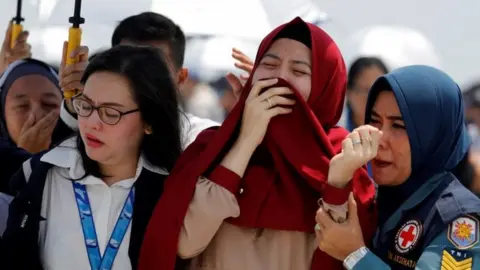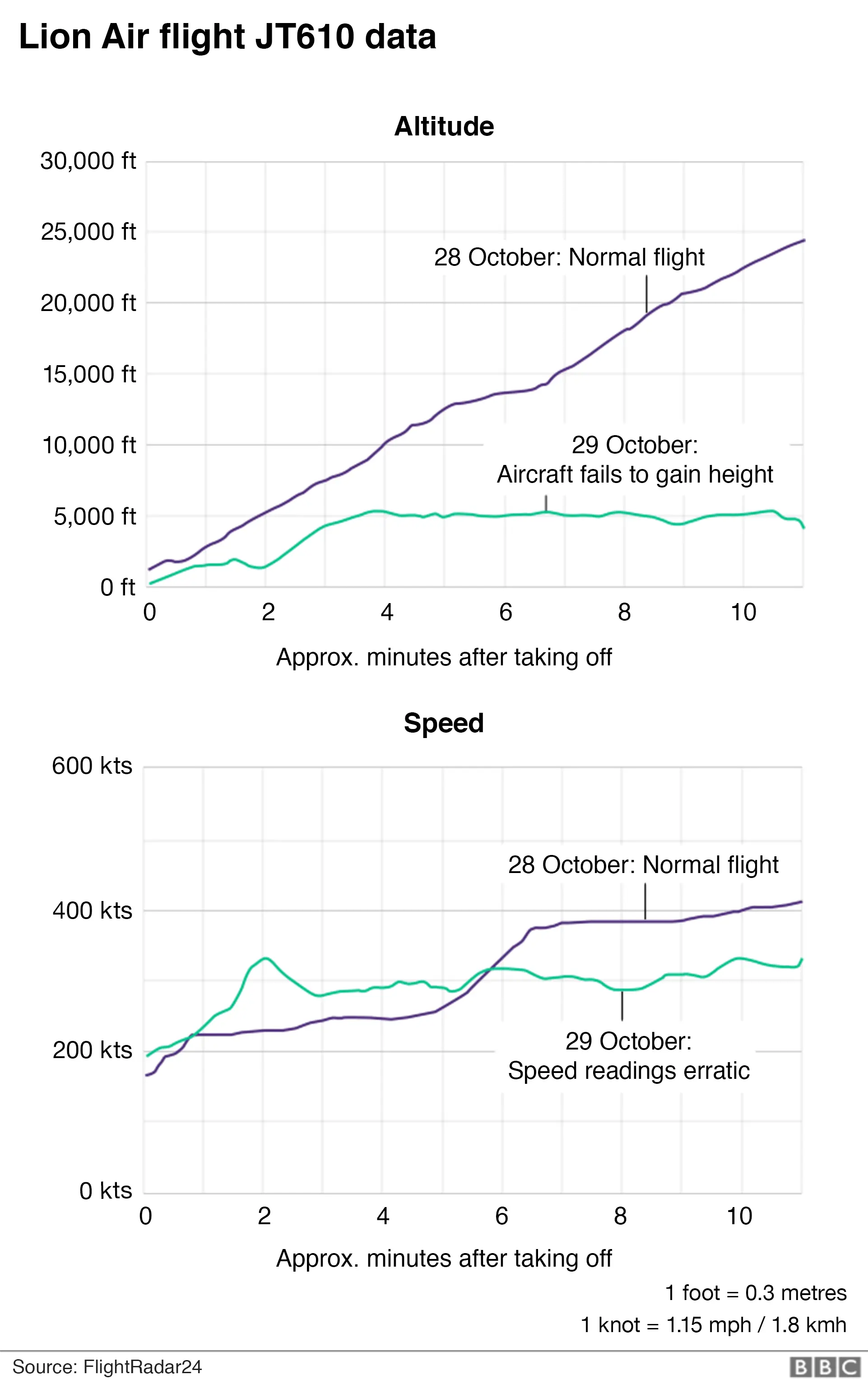Lion Air crash: Investigators say plane was 'not airworthy'
 Reuters
ReutersIndonesian investigators have said the Lion Air plane that crashed last month killing 189 people was not airworthy and should have been grounded.
The Boeing 737 Max plane crashed into the Java Sea shortly after departing from Jakarta on 29 October.
A preliminary report has found technical problems had been reported on previous flights.
The 737 Max is a new version of Boeing's original 737 and has become its fastest selling plane.
The preliminary report details what is known by authorities about the short time the plane was in the air, but investigators said it did not give a definitive cause for the accident.
What's in the report?
The findings by the National Transport Safety Committee (KNKT) suggest that Lion Air put the plane back into service despite it having had problems on earlier flights.
The pilots appeared to struggle with an automated system designed to keep the plane from stalling - a new feature in the 737 Max family.
Anti-stall systems prevent a plane from pointing upwards at too high an angle, where it could lose its lift.
However, during the 29 October flight, the plane's automatic anti-stalling system repeatedly forced the plane's nose down, even when the plane was not stalling - possibly due to a faulty sensor, the report said.
Pilots tried to correct this by pointing the nose higher, until the system pushed it down again. This happened more than 20 times.
It is unclear why the pilots did not employ procedures to disable the automated system.
Nurcahyo Utomo, aviation head at the National Transport Safety Committee, said it was "too early to conclude" whether the anti-stall system had contributed to the crash.
He added that the plane experienced similar problems during its previous flight from Denpasar in Bali to Jakarta.
"In our opinion, the plane was no longer airworthy and it should not have continued," he said. The committee's report itself, though, does not spell out that conclusion.
The report said that Lion Air's safety culture should be improved and the airline should ensure the operations manual is followed "in order to improve the safety culture".
It also says the carrier must ensure "all operations documents are properly filled and documented".


What does Boeing say?
In a statement, plane manufacturer Boeing said that it was "deeply saddened" by the loss of the Lion Air flight.
"As our customers and their passengers continue to fly the 737 Max to hundreds of destinations around the world every day, they have our assurance that the 737 Max is as safe as any airplane that has ever flown in the skies."
Boeing said that "the appropriate procedure to address unintended horizontal stabiliser movement" was contained in the relevant flight manuals.
It said that the preliminary report showed that the correct procedures to counter the plane's nose being pushed down were carried out during the Denpasar flight the day before the crash.
However, it was not clear if they procedures were followed during the 29 October flight that crashed, Boeing added.
In an interview with the BBC, KNKT aviation head Nurcahyo Utomo appeared to dispute Boeing's account about the flight manuals.
"We haven't found the information in the manual relevant to the new feature to the 737- MAX, related to the feature for the stall prevention system," he said.
Some pilots have also complained that they were not given all the relevant information about the differences between the latest anti-stall system, and older models, US media report.
How did the 29 October crash unfold?
The plane was making a one-hour journey to the western city of Pangkal Pinang when it went down.
The jet crashed following a request from the pilot for permission to turn back to the airport minutes after taking off from Jakarta.


Investigators had previously revealed that the plane, on previous flights, had experienced technical problems related to airspeed and altitude readings.
Therefore the "angle-of-attack" sensor, which contributes to those readings, had been changed the day before the crash.
The plane's flight data recorder has been retrieved but authorities are yet to locate the cockpit voice recorder which could provide more information about how the pilots reacted.
Victims' families are suing Boeing over alleged faults with the jet's design, focusing on the automated safety feature.

'We want to understand who is responsible'
Rebecca Henschke, BBC Indonesia editor, Jakarta
Rini Soegiyono's sister and brother-in-law were on the flight. After hearing the preliminary findings, she said she had mixed emotions.
"Sad, grieving, mourning, angry and disappointed - these are all the words that describe how I am feeling. But I am trying to be objective and strong."
She, like many grieving families, is mostly frustrated that the search for the remaining passengers has officially ended.
"There are still 64 families who haven't had their loved ones' remains identified and we have had to really push to get Lion Air and the authorities to search again for them. It's not good enough."
They want the airline to fund a search to find the remaining passengers as well as the cockpit voice recorder that hasn't been retrieved. It will be key, she says, to understanding what went wrong.
"We are watching and waiting to understand who is responsible. I know the world is also watching. It's important to know so it will not happen again. We don't want any family to have to go through what we are going through."

Indonesia's air safety record
Budget airline Lion Air has in recent years risen to become a major player in South East Asia's low cost aviation sector.
The airline, which also operates Batik Air and Wings Air, has a dubious safety record, though, and has had more accidents than other airlines in the country.
Overall, Indonesia's aviation safety record has improved a lot since the days when even its national carrier Garuda was blacklisted from European and US airports over safety concerns.


